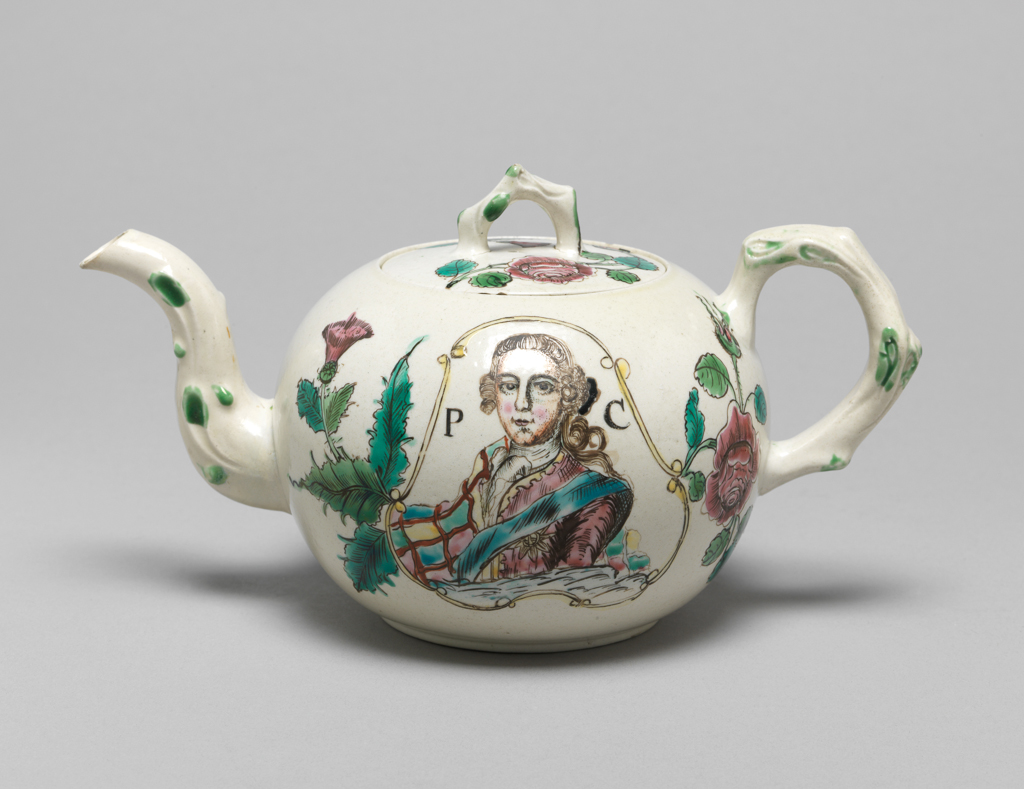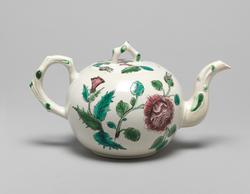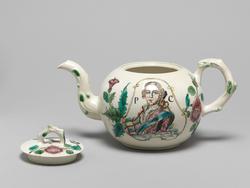Current Location: Gallery 27 (Glaisher)
Maker(s)
Factory:
Unidentified Staffordshire Pottery
Entities
Categories
Description
White salt-glazed stoneware painted in enamels with a bust portrait of Prince Charles Edward Stuart, initials P C, thistles and roses
White salt-glazed stoneware painted in turquoise, green, pale yellow, shades of dark pink, and black enamels. The pot has a globular body with applied crabstock handle and spout, and a circular cover with crabstock handle, with a pierced ventilation hole below it. There are five holes pierced in the wall of the pot behind the spout to emit the tea. One side is painted with a bust portrait of Prince Charles Edward Stuart, the Young Pretender, flanked by the initials P C, and enclosed by a wavy three sided yellow stem from which branches a thistle spray on the left and a rose spray on the right. On the other side there is a thistle spray and a rose spray, and on the cover a curving rose spray and a smaller thistle spray. The handles and sprout are dabbed with green here and there.
Notes
History note: Unknown before donor, Mrs W.D. (Frances Louisa) Dickson, Bournemouth
Legal notes
Given by Mrs W.D. Dickson
Measurements and weight
Height: 12 cm
Length: 19.1 cm
Acquisition and important dates
Method of acquisition: Given
(1950-09)
by
Dickson, W. D. (Frances Louisa), Mrs
Dating
18th Century, third quarter
George II
George III
Circa
1755
CE
-
1765
CE
Note
This teapot commemorates Prince Charles Edward Stuart (1720-88), grandson of the deposed James II of England and VII of Scotland, a Roman Catholic who had ruled from 1685-88. Prince Charles was brought up as a Roman Catholic by his father Prince James Edward Francis Stuart (1688-1766) who lived in Rome, and was known as the 'Old Pretender' (claimant). In 1745 with French assistance, Prince Charles travelled to Scotland to lead a rebellion against the Hanoverian and Protestant George II. Initially successful, the rebels were defeated at the Battle of Culloden in April 1746, and 'Bonnie Prince Charlie' fled to France where he stayed until 1748. He made a brief incognito visit to London in 1750, but failed to get support for a further rebellion. After his father's death, he continued to claim the thrones of Scotland and England. He spent the latter part of his life in Rome, where he died. The Pretender's supporters were known as Jacobites (from Jacobus, Latin for James). During the 1750s and 1760s a considerable amount of English glass and ceramics were decorated with portraits of the Prince, and/or Jacobite emblems such as roses, and thistles, but this does not seem to have reflected a widespread desire to restore the Stuart line. In his youth the Prince was a handsome, brave and romantic figure, as shown by his portrait by Alan Ramsay, painted iEdinburgh in 1745, but as he aged it became clear that he would not make a satisfactory monarch, and support for the Stuart cause dwindled.
School or Style
Rococo
People, subjects and objects depicted
Components of the work
Decoration
composed of
enamel
( turquoise-green, green, yellow, shades of dark pink, and black)
Surface
composed of
salt-glaze
Body
Handles And Spout
Materials used in production
White stoneware
Inscription or legends present
- Text: P C
- Location: On either side of portrait
- Method of creation: Painted in black enamel
- Type: Initials
References and bibliographic entries
Identification numbers
Accession number: C.112 & A-1950
Primary reference Number: 71372
Stable URI
Audit data
Created: Saturday 6 August 2011
Updated: Tuesday 30 April 2024
Last processed: Wednesday 14 May 2025
Associated departments & institutions
Owner or interested party:
The Fitzwilliam Museum
Associated department:
Applied Arts






